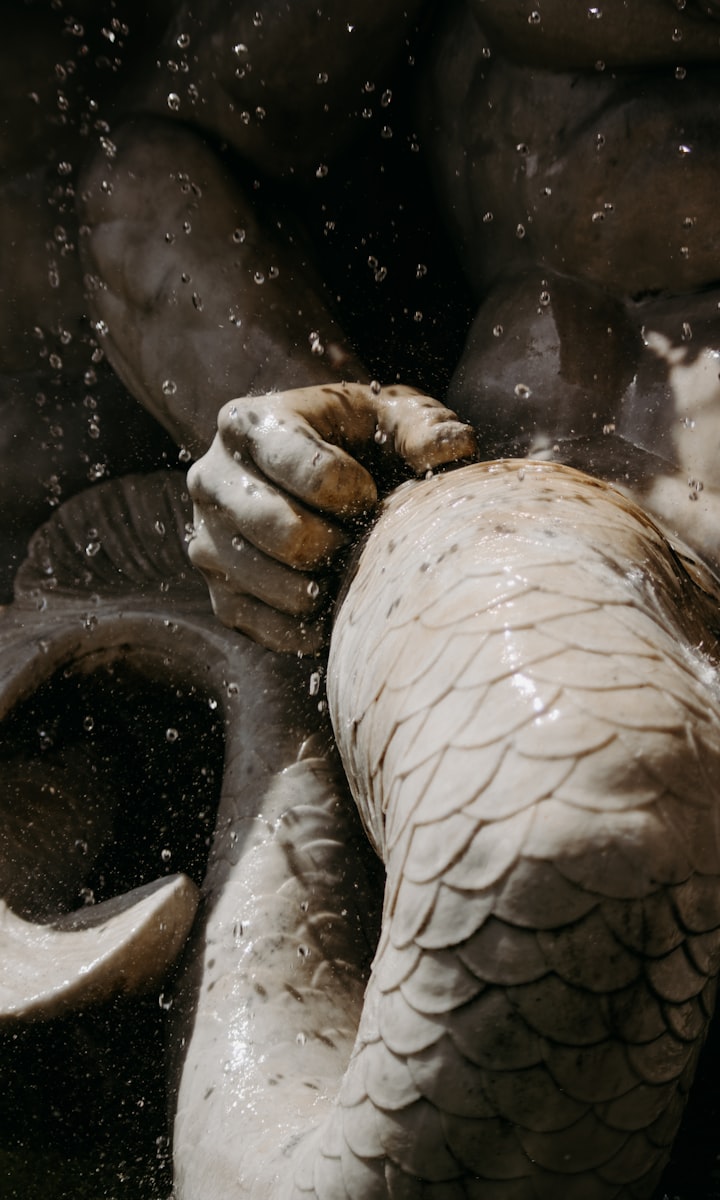In the Trenches
Sit right back and you'll hear a tale, a tale of sisters three...

Pssssst. Hey, you. Psssssttttgglllrarararargggghhhhhh. Oh. Sorry about your shoes, laddie. It’s just sea water. Bit of squid. What I mean to say is—psssssssttttt. Want to hear a story? Once you do, you’ll never want to go back to the sea.
It’s about the Trench sisters. Kin to the gurry shark, they were, cursed with human features down to their waists, but they wore it well. All three were blunt of nose and weak of chin; mottled, bulbous, languid in their movements, their flesh so rich with piss, it perfumed the waters around them.
They were once the Rift sisters, named after their home waters tucked between Greenland and Labrador, but the giant bottom-dwelling wolffish—he’d travelled widely—praised their looks, and said they outshone any creature from the deepest part of the ocean. From then on, they became Trench. Of the Trenches. More Trench, down and down, than Rift, straight across.
They lived for practical jokes.
Diamantina, the eldest, she was the greatest beauty. Close up, her staring eyes and inward-hooked teeth would charm any undersea dweller, but she could shape her body to look nearly human and flash her tail in the moonlight: a dance to entice any seafarer unfortunate enough to see it. Swimming close to shore, she always made sure that the ships would swerve to meet her, cracking their hulls on hidden rocks. How she clobbered together her meaty hands then! And invited us—I mean all of us: her friends, her brethren, her closest frenemies—to nibble on sailor meat.
One of Mariana’s favorite tricks was to tip the funeral pyres of dead Vikings. With glee, she’d wait until the burning boat had drifted into her realm, then bump its belly until it flipped, halting the deceased’s ascent to Valhalla and pissing off the clans. Had she been a land-dweller, her laugh would have echoed against the hills at the sight of solid, stoic wives and brothers howling and clutching their heads, watching helpless as their hearty bonfires sputtered into damp driftwood. Instead, her chuckles gurgled into the soft spines of coral and were absorbed by anemone.
Kermadec, the youngest, a mere child at three hundred years old, loved to prank her sisters most of all. She would steal the mirrors they’d scavenged from downed watercraft and lick the silver backings, melting them with the harsh chemicals of her tongue, warping them irreparably. When her sisters would swim to where Kermadec had propped a ruined mirror so it winked enticingly in the weak sunlight, they would no longer see their rounded, mottled noses or the sleek lines of the parasitic worm that floated coyly from each eye—the devastating, single lash of a haj havfrue. They would, instead, see angled faces, sharp cheekbones, nipped-in waists. Gasping in disgust, they’d turn on their sister with gnashing teeth.
“How fucking dare you, you absolute clownfish. I look—God, Kerma—I almost look human!”
Rumor was they had an elder brother, Molloy, and that he was the wise one, the ældre fisk, but he didn’t understand their ways. He was their favorite laughingstock, it’s said. But this story is—glurrrhgggghghghhgh—sorry, I’ve a bit of a cough. This story is not about him.
It’s about the day the sisters discovered they’d been put on the Viking menu. Of all the fish-flesh in the sea, theirs had always been well nigh the least edible to land-dwellers. Anyone who’d observed the unfortunate effects of feasting on gurry sharks would note the listlessness, the stumbling, the seizures, so it was a shock to hear Mariana’s story, told upon returning from a Viking funeral. She’d seen them stripping the flesh from a gurry shark and hanging it outside a beach hut like a trophy. Or a warning.
“They’re eating us,” Mariana cried. “Well, they’re eating Kunik.” The shark had been one of Mariana’s favorites.
Kermadec brought the next piece of news. She’d been playing near the beach, waiting for low tide to steal a knife from the fishermen’s boats, when she heard two women talking.
“The Chieftain wants a special meal for Jolablot,” one of them said. “He’s asked for haj havfrue.”
The other woman laughed. “How does he think we’re to catch a bitch of the sea? Not that they don’t deserve it, mind, but they’re hardly going to sit by while we wrap them in a net.”
“My Bjørn says he has a way. You’ll see.”
Anyw—glahhhhhrrrhgghgh—I beg your pardon. Must be a bone stuck in my throat. I swore I filleted my supper better than this.
Anyway, the sisters continued to see signs that the Viking palate had advanced, that the bitterest of haj flesh was now a delicacy, and they feared their time was coming. Molloy tried to soothe his sisters, to remind them that delicacies came and went out of fashion over the ages. He tried to tease, “Not even the strongest clan-father will withstand the taste of acid and urine for too long, and you, my dears, will live much longer.”
(Diamantina pointed out that his anglerfish hat wobbled like a limp dick when he spoke. That shut him right up.)
The Trenches made a plan. They called in centuries-old favors and passed secret messages by tucking them under the soft tongues of giant clams. They summoned the Rifts and Fjords, the Arcs and the Basins. They patched old wounds and grumbled through new pacts. The only thing that mattered now was a united front: Viking versus haj havfrue. The living gods of oceans deep and their fragile, human enemies.
Luckily, The sisters had more than looks, more than the gritty stab of placoid scales and milky gaze of creatures used to fathomless caves. More then a shared, predatory intelligence: they had a sense of fucking humor. The sisters wouldn’t just defeat their carnivorous foes; they would humiliate them.
What’s that? Now, I’m sure you have another moment or two for this old fellow and his tales. It’ll be worth your while, laddie, that I can tell you true.
First, the sisters waited for the Vikings to go raiding, an hour’s row downshore. Upon their return, the clan found their beach strewn with Men-of-War, long blue tendrils so thick on the ground they sank to their ankles in stinging jelly ropes. They fled into the ocean to soothe the burn, only to find eels gnawing their knees and the long arms of octopuses hugging them to the ocean floor.
“Take only three,” Kermadec gurgled to her kin as she waved her cartilaginous hands in delight. “Be sure to gnaw their chins, make them nice and small, like ours.” She flexed her nares in disgust as the survivors dragged themselves to shore, into the arms of their weeping wives, and waited for the sea to calm before they retrieved their mangled kin.
The clan planned a triple funeral, one shining boat for each dead man, piled high with flowers and gold. Once the flaming arrows were launched—a perfect arc to ignite each corpse—Mariana crowed in glee. “Now!” she urged the Orca sisters as they doused the flaming decks with tails and fins before the fires could take hold. “Easy,” she said, once the fires were out. “We need these ships drenched, but afloat!”
Oh, the gasps as the Vikings watched their pyres gutter. Oh, the groans as they perceived signs of ill fortune! “The dead will have their vengeance!” they wailed. “They’ll not rise to Valhalla! They’ll nary find peace!”
A funny thing about the Viking clans: they believed the dead can rise again, as draugr. The sisters had long known and mocked them for it. “They burn or bury their dead, and lose track of them,” Mariana once said, philosophically. “What a waste! If it’s dinner, then you know exactly where it’s gone. No chance of it perambulating later on.”
With the funeral ships quenched, the Trenches began their final show. They heaved themselves onto the boats, one to each. Their many co-conspirators pushed the boats to shore, gliding underneath the chop so each barge would appear to return on a wave of vengeance and sorrow. The sisters knew that so long as they hid their lower halves from view, they would pass as the drowned, mangled men.
Diamantina had taught them the ways of humanfolk: “You pose your arms like so,” she’d said, holding them out at her sides, like a land-brute. “You make yourself rigid like this.” She used her muscles to firm her flexible spine. Then she imitated their speech, a hearty, “Ung blurb luggugguggugg,” until the waterfolk had nearly split themselves laughing.
There was no laughing once their drama began to unfold, lest they ruin the fun. The moment those ruined hulls scraped the sandy shore, the sisters nearly bit their lips in twain trying to hold still. They listened to the murmurs of the assembled clan, their cautious footfalls approaching the floating caskets, scarred and smoking and stinking with flesh-rot.
One Viking boy, braver than the rest, a leader in the making, crept forward to pull back his father’s shroud. Up shot Mariana, bellowing like a sea lion, spraying salt and sand and seawater from her cavernous mouth, kelp twisted around her giant incisors like ribbons on a Maypole. Mariana and Kermadec followed suit—pop! pop!—shrieking like they’d been pierced by a stingray’s tail, their scaly arms glittering in the waning daylight.
Oh, the chaos! What a glorious sight! Buxom women scrabbling backward on their hands and bums, tripping over the oafish figures of their sons and remaining husbands, all of them moaning with horror, eyes rolling back to the whites.
“What demand you of us, oh Gods? We beseech thee!” One blubbering woman managed to spit this question through chattering teeth, gaze cast skyward, as she rolled across her daughter, her nephew, hands skittering like a turtle covering freshly lain eggs.
Kermadec had to duck her head to keep from grinning, but Diamantina, all theater, drew herself to her full height, tossed the dead man’s arms across her neck like a stole, and peered out from beneath his skull, which she wore as a headdress.
“You have ingested the flesh of the sacred haj and for this, your kind are damned for one hundred times one hundred years.”
Heavens, the wailing. “Oh, what is to be done? Is there nothing for it?” Etcetera. Horrid blgggghhhhhhhrrrrgh—pardon me—horrid business, human begging.
“Nay,” Diamantina snarled. “Why should the makers of land and sky and sea show mercy upon your weak—”
“Well, actually,” Mariana cut in, picking a clump of ravaged flesh from her teeth with a sliver of bone. “If you could just, you know, not eat the fucking mersharks, we’d probably let this one slide.”
Diamantina shot her sister a glare. She’d practiced her speech a thousand times in front of her drowned funhouse mirror, and she hated being shown up in public. Mariana took no notice.
“You’re really gross and we should probably kill you for it but, you know. We’re feeling forgive-y today.”
“We are?” Kermadec asked, rolling her milky eyes.
“Yes. We are.” Mariana kicked the dead man’s boots off her boat, ignoring the way his femur skittered off the steaming wood. Diamantina sighed.
“Yeah, okay. Just—don’t let us catch you doing this shit again.”
Word spread, oh yes it did. The clans never aimed to touch mermaid flesh again.
And that, my lad, is the story of the vengeance of the sea. You’ve noticed the film o’er my eyes, have you? The way my lash flutters of its own accord? Aye, the name’s Molloy, and I’ve got sisters three who’ve turned their pearly eyes on you.
Don’t think we haven’t noticed that your ship takes all it can grab, and your nets trawl deep. Quite a few strange creatures in your bycatch lately, quite a few gurry sharks. You’d best find another way to fish, lad, or hope your catches don’t grow stranger still.
About the Creator
Maisie Krash
fiction writer, probably a witch






Comments
There are no comments for this story
Be the first to respond and start the conversation.